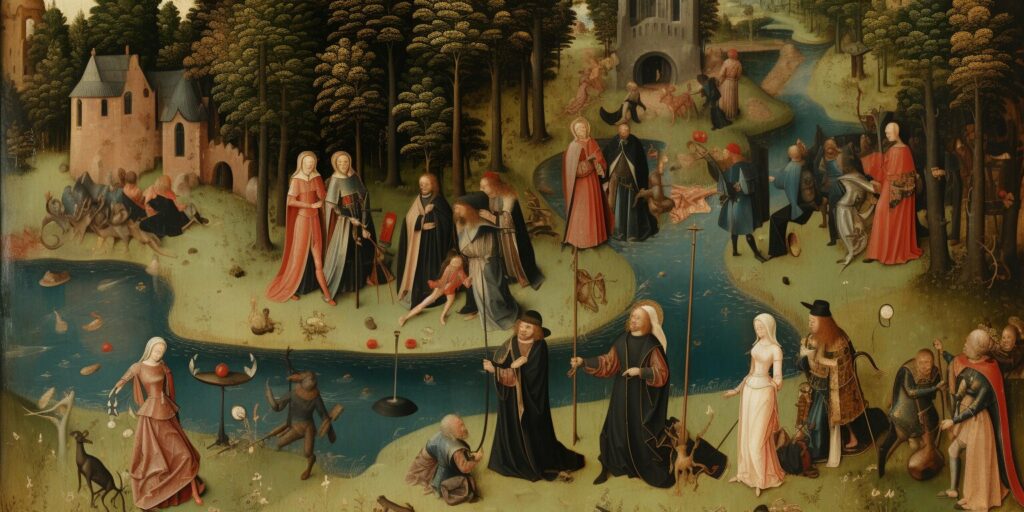Medieval history, also known as the Middle Ages, is a fascinating period that spanned from the 5th century to the 15th century in Europe. This era is often perceived as a dark and turbulent time, but it was also a period of significant cultural, social, and political development. To truly appreciate medieval history, it is essential to dive into its key aspects and unravel the richness of this intriguing period.
The Feudal System
One of the defining features of the medieval period was the feudal system. Feudalism was a hierarchical social and economic structure that regulated the relationships between lords, vassals, and serfs. At the top of the pyramid was the king or monarch, who granted land or fiefs to lords in exchange for military service and loyalty. In return, the lords provided protection to their vassals, who, in turn, worked the land and paid tribute.

Credit: knightstemplar.co
The Role of the Church
Religion played a central role in medieval society, with the Catholic Church holding immense power and influence. The church served as the spiritual authority, shaping people’s beliefs and values. Monks and nuns lived in monasteries and convents, dedicating their lives to prayer, study, and service. Cathedrals stood as architectural marvels and symbols of faith, showcasing the intricate craftsmanship of the time.

Credit: www.amazon.com
The Crusades
The 11th to 13th centuries witnessed a series of holy wars known as the Crusades. These military campaigns were launched by European Christians in an attempt to reclaim the Holy Land from Muslim control. The Crusades had a profound impact on medieval society, leading to cultural exchange, trade, and the spread of new ideas and technologies. They also fostered the growth of towns, as increased commerce and pilgrimage routes emerged.
Kings, Knights, and Chivalry
Medieval society was characterized by a warrior class, including knights who served their lords. Knights followed a code of conduct known as chivalry, which emphasized bravery, loyalty, and honor. Tournaments and jousts were popular events where knights displayed their skills and prowess. Kings held power as political leaders, often relying on the support of their nobles and maintaining a complex system of alliances and rivalries.
The Black Death
One of the most devastating events in medieval history was the outbreak of the bubonic plague, widely known as the Black Death. This pandemic, which occurred in the 14th century, had a profound impact on Europe, resulting in the death of millions of people. The Black Death led to social upheaval, economic changes, and shifts in religious beliefs, ultimately redefining the dynamics of medieval society.
The Renaissance and the End of the Middle Ages
The Middle Ages gradually gave way to the Renaissance, marking the end of this unique era. The Renaissance brought about a resurgence of interest in classical learning, art, and science. It was a time of great intellectual and cultural awakening, leading to significant societal transformations.
Exploring Medieval History
Medieval history continues to captivate the imagination of people worldwide. It offers valuable insights into the roots of our modern society and the foundations upon which it was built. By understanding the feudal system, the role of the church, the Crusades, knights and chivalry, the Black Death, and the transition into the Renaissance, we gain a comprehensive view of this complex period in human history.
So dive into the world of medieval history, explore its stories and legends, and appreciate the achievements and challenges faced by those who inhabited this remarkable era.
Frequently Asked Questions For Understanding Medieval History : Unlock The Timeless Mysteries
Faq: What Was The Impact Of The Black Death In Medieval Europe?
The Black Death had a devastating impact on medieval Europe, resulting in the loss of millions of lives and causing significant economic and social upheaval.
Faq: How Did Feudalism Shape Medieval Society?
Feudalism played a crucial role in medieval society, with a hierarchical structure where lords owned land and granted it to vassals in exchange for loyalty and service.
Faq: What Were The Major Factors That Led To The Fall Of The Roman Empire?
Multiple factors contributed to the fall of the Roman Empire, including internal decay, invasions by barbarian tribes, and the inability to effectively manage such a vast territory.
Faq: How Did The Crusades Impact Medieval Europe?
The Crusades had far-reaching effects on medieval Europe, including increased contact with the Muslim world, the spread of new ideas and technology, and the redistribution of wealth and power.
Guest Author Sakhawat-Shuvo wrote and edited this Article based on his best knowledge and understanding. These opinions and remarks are not endorsed or guaranteed by epichistoria.com or EpicHistoria. The Epic Historia does not guarantee this article’s content. Readers should verify and use their judgment before trusting the content. Also, the Images used in this Article are the copyright of their Respective Owners. Please use our Comment Box or Contact Us form to report this content. This information is not accountable for losses, injuries, or damages.


